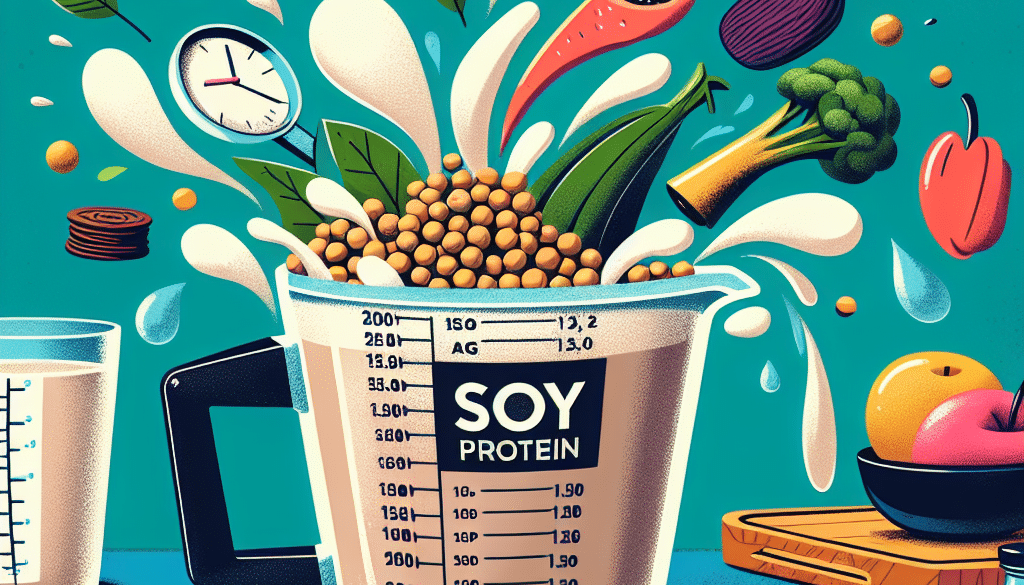Is Too Much Soy Protein Isolate Bad For You?
-
Table of Contents
- Soy Protein Isolate: How Much Is Too Much for Your Health?
- Understanding Soy Protein Isolate
- The Benefits of Soy Protein Isolate
- Potential Concerns with Soy Protein Isolate
- Phytoestrogens and Hormonal Effects
- Impact on Thyroid Function
- Genetically Modified Soybeans
- Reduced Nutrient Absorption
- How Much Soy Protein Isolate Is Safe?
- Case Studies and Research Findings
- Recommendations for Soy Protein Isolate Consumption
- Conclusion: Balancing Soy Protein Isolate Intake for Optimal Health
- Discover ETprotein’s High-Quality Protein Products
Soy Protein Isolate: How Much Is Too Much for Your Health?

Soy protein isolate is a highly refined form of soy protein that is extracted from defatted soybean flakes. With its high protein content and low fat and carbohydrate levels, it has become a popular ingredient in various food products, including protein bars, shakes, and meat substitutes. However, the question of whether consuming too much soy protein isolate can be detrimental to one’s health has been a topic of debate among nutritionists, health experts, and consumers alike. This article delves into the potential impacts of excessive soy protein isolate consumption on human health, supported by scientific research and expert opinions.
Understanding Soy Protein Isolate
Soy protein isolate is derived from soybeans, a legume rich in proteins. The process of making soy protein isolate involves removing the fat and carbohydrates from the soybeans, leaving behind a product that is up to 90% protein. This makes it an attractive option for those looking to increase their protein intake without consuming additional fats and carbs.
The Benefits of Soy Protein Isolate
- High-Quality Protein Source: Soy protein isolate is a complete protein, containing all nine essential amino acids necessary for human health.
- Low in Fat and Carbohydrates: It is ideal for individuals looking to manage their weight or reduce their intake of fats and sugars.
- Cholesterol-Free: Soy protein isolate can be a heart-healthy alternative to animal proteins that contain cholesterol.
- Lactose-Free: It is suitable for those with lactose intolerance or dairy allergies.
Potential Concerns with Soy Protein Isolate
Despite its benefits, there are several concerns associated with the overconsumption of soy protein isolate:
Phytoestrogens and Hormonal Effects
Soy contains phytoestrogens, plant-based compounds that can mimic the hormone estrogen in the body. Some studies suggest that high levels of phytoestrogens could potentially disrupt normal hormonal function, although research in this area is ongoing and results are not conclusive.
Impact on Thyroid Function
There is some evidence to suggest that soy proteins, including soy protein isolate, may interfere with thyroid function, particularly in individuals with pre-existing thyroid issues. However, more research is needed to fully understand this relationship.
Genetically Modified Soybeans
Most soy protein isolate comes from genetically modified (GM) soybeans, which raises concerns for those who prefer to avoid GM foods due to potential environmental and health risks.
Reduced Nutrient Absorption
Soy protein isolate may contain antinutrients that can reduce the absorption of certain minerals, such as calcium, magnesium, and zinc, although the significance of this effect in humans is still under investigation.
How Much Soy Protein Isolate Is Safe?
The amount of soy protein isolate considered safe can vary depending on individual health factors and dietary needs. The Food and Drug Administration (FDA) has indicated that consuming 25 grams of soy protein per day, as part of a diet low in saturated fat and cholesterol, may reduce the risk of heart disease. However, this does not specifically address the consumption of soy protein isolate.
Case Studies and Research Findings
Several studies have examined the effects of soy protein isolate on health. For example, research has shown that soy protein can help lower LDL cholesterol levels, which is beneficial for heart health. Other studies have explored the potential impact of soy on cancer risk, bone health, and menopausal symptoms, with mixed results.
Recommendations for Soy Protein Isolate Consumption
To minimize potential risks while reaping the benefits of soy protein isolate, consider the following guidelines:
- Moderation: Include soy protein isolate as part of a balanced diet rather than relying on it as the primary source of protein.
- Variety: Combine soy protein isolate with other protein sources, such as lean meats, fish, dairy, and plant-based proteins.
- Quality: Choose non-GM, organic soy protein isolate products when possible to avoid potential concerns associated with genetically modified soy.
- Medical Advice: Consult with a healthcare provider or nutritionist, especially if you have specific health conditions or concerns.
Conclusion: Balancing Soy Protein Isolate Intake for Optimal Health
In conclusion, while soy protein isolate offers several health benefits, it is important to consume it in moderation and as part of a diverse and balanced diet. Paying attention to the quality of the soy protein isolate and considering individual health factors can help ensure that you enjoy the benefits without experiencing potential negative effects. As with any dietary change, it is advisable to consult with a healthcare professional for personalized guidance.
Discover ETprotein’s High-Quality Protein Products
If you’re looking to incorporate high-quality protein into your diet, ETprotein offers a range of organic bulk vegan proteins that are non-GMO and allergen-free. Their products, including organic rice protein, pea protein, and various seed proteins, provide excellent alternatives to soy protein isolate. With a neutral taste and high purity levels, ETprotein’s offerings are suitable for various industries and dietary preferences.
About ETprotein:
ETprotein, a reputable protein and L-(+)-Ergothioneine (EGT) Chinese factory manufacturer and supplier, is renowned for producing, stocking, exporting, and delivering the highest quality organic bulk vegan proteins and L-(+)-Ergothioneine. They include Organic rice protein, clear rice protein, pea protein, clear pea protein, watermelon seed protein, pumpkin seed protein, sunflower seed protein, mung bean protein, peanut protein, and L-(+)-Ergothioneine EGT Pharmaceutical grade, L-(+)-Ergothioneine EGT food grade, L-(+)-Ergothioneine EGT cosmetic grade, L-(+)-Ergothioneine EGT reference grade and L-(+)-Ergothioneine EGT standard. Their offerings, characterized by a neutral taste, non-GMO, allergen-free attributes, with L-(+)-Ergothioneine purity over 98%, 99%, cater to a diverse range of industries. They serve nutraceutical, pharmaceutical, cosmeceutical, veterinary, as well as food and beverage finished product distributors, traders, and manufacturers across Europe, USA, Canada, Australia, Thailand, Japan, Korea, Brazil, and Chile, among others.
ETprotein specialization includes exporting and delivering tailor-made protein powder and finished nutritional supplements. Their extensive product range covers sectors like Food and Beverage, Sports Nutrition, Weight Management, Dietary Supplements, Health and Wellness Products, and Infant Formula, ensuring comprehensive solutions to meet all your protein needs.
As a trusted company by leading global food and beverage brands and Fortune 500 companies, ETprotein reinforces China’s reputation in the global arena. For more information or to sample their products, please contact them and email sales(at)ETprotein.com today.












